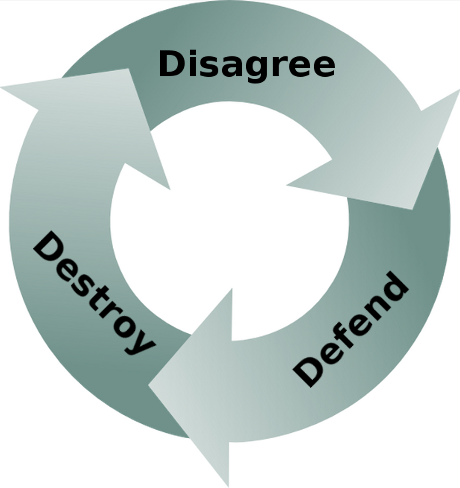 It is a guarantee that don’t like someone on your development team and they have behaviors or habits that you might find objectionable:
It is a guarantee that don’t like someone on your development team and they have behaviors or habits that you might find objectionable:
- Mashable talks about 45 most annoying office habits
- [the nest] talks about 10 Annoying Work Habits That Can Get You Fired.
But as irritating as you find your co-workers, odds are:
You do something that they find annoying…
Annoyances and poor communication can lead to conflicts that range from avoidance to all out war where people get drawn into taking sides. But consider the cost of team conflict :
| Issue | Productivity | Software Quality |
|---|---|---|
| Internal team conflict | -10% | -15% |
| Management conflict | -14% | -19% |
The table above is only showing the average result of conflict, some of us have been in situations that get much, much worse.
Software development is not a popularity contest, you don’t have to like everyone that you work with. However, if you allow your feelings of annoyance escalate into conflict then there is a real cost to your project and ultimately in your stress levels.
All conflicts start with disagreements. The Communications Catalyst2 talks about the following cycle:
- Disagree
- Defend
- Destroy
When you disagree with your coworkers then they don’t feel listened to. They will then defend their position by digging in their heels, then you will dig in your heels and the road to destruction starts. If there are any annoying habits present then the conflict will escalate quickly.
 If things get out of hand then people start taking sides and productivity takes a major hit. In the worst conflicts this leads to loss of key personnel, which has been measured to be:
If things get out of hand then people start taking sides and productivity takes a major hit. In the worst conflicts this leads to loss of key personnel, which has been measured to be:
Loss of key personnel, productivity -16%, quality -22%
Losing key personnel who have comprehensive knowledge of business rules and organizational practices tied up in their heads often causes projects to face fault and come to a stand still.
You may feel justified in starting a conflict or escalating one, however, as clever as you think you are, conflict hurts everyone — yourself included. Just remember:
It is virtually impossible to start a conflict that doesn’t boomerang back and bite you in the @ss!
4 Ways to Avoid or Reduce Conflicts
Things to consider to avoid conflict:
- Don’t disagree first, signal that the other person has been heard
- You will rarely agree with everything that someone else says, but start by agreeing with the part that you do agree with.1 This will at least signal that you have heard them and reduce their anxiety that you are not listening to them.
- Even mechanically echoing everything that they just said is a way to signal that you heard what was said.
- Once this is done, then talk about what you don’t agree with.
- Don’t interrupt people.
- When you are excited and thoughts are springing to mind then you may be tempted to do all the talking and stop listening; get this under control, take a breath, and let others talk.
- People generally consider it rude when you interrupt and will assume arrogance on your part. If you are not trying to be arrogant and someone tells you this then wake up — you need to listen.
- Don’t be frustrated when people don’t understand you
- If you really know something that others don’t then simply restating your point of view will not improve their understanding.
- If your friend is lost in a new shopping mall then describing your location will not be helpful in helping him find you. You need to find out where he is and walk him through the steps of getting to your location.
- Be open to the idea that there might be something that you are not seeing. With additional information you might revise your point of view.
- Don’t automatically assume that someone is insulting you
- In virtually every case where someone feel insulted this is a knee-jerk reaction to a misunderstanding where no insult was intended.
- Jumping to conclusions is not good under any circumstance, but is lethal in social interactions.
Managers should be on the lookout for the signs of conflict and clear them up while they are still small. Most conflicts arise from simple misunderstandings.
You will notice that most organizations will promote people based on their ability to work with others and resolve conflicts over competence.
Learning how to resolve conflicts is often your ticket to an overdue promotion…
References
- Carnegie, Dale. How to Win Friends and Influence People. 1998.
- Connolly, Mickey and Rianoshek, Richard. The Communication Catalyst, 2002.
- Jones, Capers and Bonsignour, Olivier. The Economics of Software Quality. Addison Wesley. 2011
- Kahneman, Daniel. Thinking Fast and Slow. 2011
Side Note
My best friend also works in the tech sector, and despite being friends for almost 25 years we have very few beliefs or habits in common. There are subjects that we agree on, but then we don’t agree on how they should be handled. We virtually never take the same action under the same conditions.
Even though we are very different people this has never stood in the way of us being able to do things together. If you look around you will see radically different people that manage to cooperate and even thrive.
The key to all working relationships especially when the other person is very different from you is respect.
